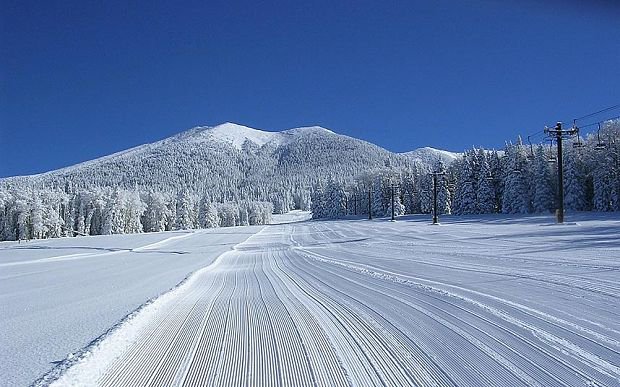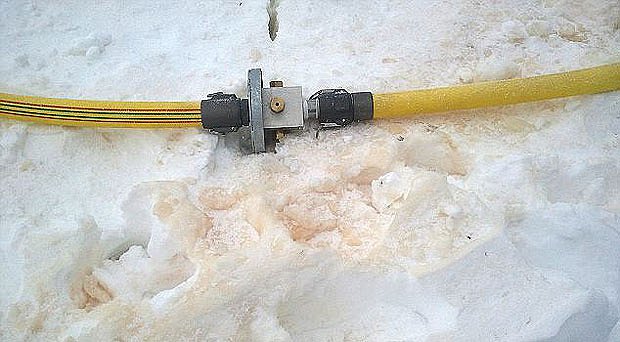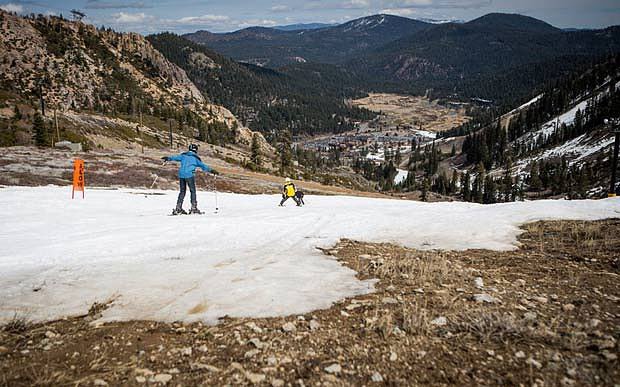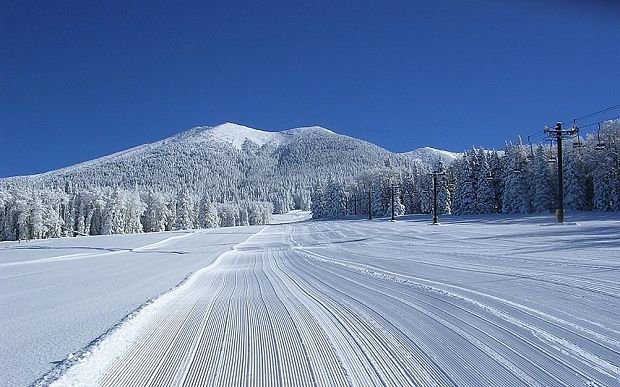
No one recommends you eat yellow snow, but would you ski on it?
You may not have a choice as ski resorts under pressure from climate change and limited fresh water reserves make the environmentally friendly switch to sewage effluent, that is, treated waste water, to make artificial snow. It is a move that would have come in handy in Lake Tahoe, California, this season as the region endured the fourth year of a crippling drought that saw its slopes bare and snowmaking halted due to depleted water supplies.
It was the North Arizona resort of Snowbowl that set the precedent in 2012 when, after a decade of legal wrangling, it became the first ski area in the world to make 100 per cent of its artificial snow from treated waste water.
The decision, though groundbreaking in ecological terms, sparked a furious response from 13 Native American tribes who disapproved of recycled sewage being pumped on to what they considered a sacred mountain.
Jason Stratton, a spokesperson for Snowbowl, said at the time: “You don’t take a precious resource like water in the desert and throw it on the ski hill. There were winters when we were only open for a couple dozen days [and] snowmaking is a must for us to continue to exist. It gives us a future.”

However, the initial unveiling of this revolutionary initiative was marred somewhat by the the white stuff in question actually being yellow stuff – the unfortunate discolouring was blamed on rusty equipment, rather than as a result of the snow's less-than-savoury provenance.
Though the project continued, the issue is not entirely settled. Last year, the Arizona Supreme Court granted the state's Hopi Tribe permission to bring a lawsuit against the nearby city of Flagstaff for selling waste water to Snowbowl on account of it causing a "public nuisance". The suit has not yet been filed.
As recently as December last year there were protests at the ski resort, with a member of the Protect the Peaks foundation, a group founded in opposition to Snowbowl's snowmaking practises, calling the resort's actions "beyond environmental racism" and an "act of cultural genocide".
Still, three years on, and other North American ski areas have followed Snowbowl's example, including Bear Creek in Pennsylvania, meaning around half a dozen US resorts are now using waste water for snowmaking.
"Snowbowl went all the way to the US Supreme Court, it has been resolved and they are making snow," said Geraldine Link, director of public policy for the National Ski Area Association.
"We followed that case closely for the industry. In our view, and with proper education, there should be use of reclaimed water for snowmaking. Water is only becoming more scarce, and the US Environmental Protection Agency condones such reuse."

Outside of America, Mount Buller and Mount Hotham in Victoria, Australia, embarked on similar projects. In Mount Hotham, the scheme was projected to reduce the amount of fresh water taken from local streams for snowmaking from 190 to 110 million litres per year, and was backed by then Minister for Water and Environment, John Thwaites.
"Water is precious and the resource is under pressure as a result of climate change," he said. "Projects like this are an investment in the future. We have to learn to live sustainably if we are going to manage the effects of climate change."
At Mount Buller, the water recycling was trialled in 2006 and implemented in 2008. The resort has plans to widen the project to reuse the water in people's homes.
Water reuse is not a new phenomenon – Los Angeles was using recycled water to irrigate its golf courses as early as 1929 and it is now becoming commonplace for water to be treated for irrigation uses or even drinking water – but the widespread use of treated wastewater in snowmaking has not yet caught on.
At present, there's very little information on the number of ski areas in Europe that subscribe to this method of snowmaking – however, it appears to be none.
A spokesperson for the Austrian Tirol region, which includes popular resorts such as St Anton and Mayrhofen, said none of its resorts were using treated wastewater in snowmaking and that it was a legal requirement that the water used was of drinking quality. Meanwhile, a French group of environmental skiers and snowboarders called Mountain Riders has no mention of the process in its guide to environmentally friendly initiatives in ski resorts, and did not return a request for comment.
A spokesperson for Atout France, which represents the French mountains, said it was not on the radar of any of its resorts and suggested they would not require it since water supplies are healthy.
However, after a season that started exceptionally poorly, with lack of snow delaying resort openings all over the world, including Méribel and Courchevel in the Trois Vallées, France, and concern for water supplies growing, is skiing on treated sewage the future?
source - telegraph.co.uk


Comments